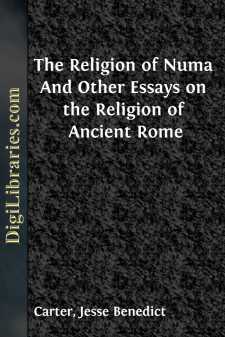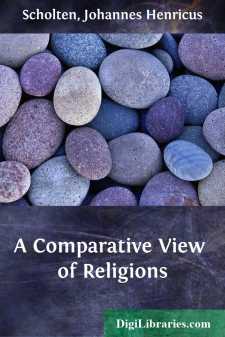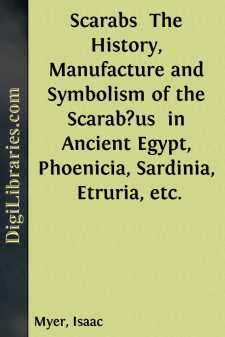Religion
- Agnosticism 2
- Antiquities & Archaeology 21
- Atheism 12
- Biblical Criticism & Interpretation 16
- Biblical Meditations 3
- Biblical Reference 1
- Biblical Studies 11
- Buddhism 8
- Christian Church 52
- Christian Education 5
- Christian Life 26
- Christianity 61
- Cults 2
- Devotional 6
- Eastern 2
- Education 4
- Eschatology 1
- Ethics 3
- General
- Gnosticism 1
- Hinduism 15
- History 28
- Holidays 10
- Inspirational 1
- Islam 8
- Judaism 3
- Leadership 1
- Meditations 3
- Monasticism 1
- Mysticism 11
- Philosophy 4
- Prayer 26
- Prayerbooks 5
- Religion & Science 12
- Sermons 54
- Spirituality 53
- Theism 2
- Theology 17
- Theosophy 15
General Books
Sort by:
CHAPTER XII. THE BEGINNING OF THE END. Nor was it unnatural that it should be. Moral precepts, philosophic guidance were no longer possible to one whose compliances or whose timidity had led him so far as first to sanction matricide, and then to defend it. He might indeed be still powerful to recommend principles of common sense and political expediency, but the loftier lessons of Stoicism, nay, even...
more...
1. The words, a nagual, nagualism, a nagualist, have been current in English prose for more than seventy years; they are found during that time in a variety of books published in England and the United States, yet are not to be discovered in any dictionary of the English language; nor has Nagualism a place in any of the numerous encyclopædias or “Conversation Lexicons,” in English, French, German...
more...
THE RELIGION OF NUMA Rome forms no exception to the general rule that nations, like individuals, grow by contact with the outside world. In the middle of the five centuries of her republic came the Punic wars and the intimate association with Greece which made the last half of her history as a republic so different from the first half; and in the kingdom, which preceded the republic, there was a...
more...
CHAPTER I. FETICHISM. THE CHINESE. THE EGYPTIANS. 1. FETICHISM. The lowest stage of religious development is fetichism, as it is found among the savage tribes of the polar regions, and in Africa, America, and Australia. In this stage, man's needs are as yet very limited and exclusively confined to the material world. Still too little developed intellectually to worship the divine in nature and her...
more...
by:
Martin Luther
LETTER OF MARTIN LUTHER TO POPE LEO X. Among those monstrous evils of this age with which I have now for three years been waging war, I am sometimes compelled to look to you and to call you to mind, most blessed father Leo. In truth, since you alone are everywhere considered as being the cause of my engaging in war, I cannot at any time fail to remember you; and although I have been compelled by the...
more...
by:
Morris Jastrow
PREFACE. It requires no profound knowledge to reach the conclusion that the time has not yet come for an exhaustive treatise on the religion of Babylonia and Assyria. But even if our knowledge of this religion were more advanced than it is, the utility of an exhaustive treatment might still be questioned. Exhaustive treatises are apt to be exhausting to both reader and author; and however exhaustive...
more...
by:
Isaac Myer
INTRODUCTION. The following work is taken in part, from an address delivered by me before, The American Numismatic and Archæological Society, at its Hall in the City of New York, on March 30th, 1893. Since that time I have been led into a train of thought, having as its basis a more philosophical treatment of the meaning of the scarabæus as a symbol, in the religious metaphysic conception of it by...
more...
by:
Anonymous
THE MORAVIANS IN LABRADOR CHAPTER I. Hudson's Bay Company first settle among the Esquimaux.—J.C. Erhardt suggests a mission—his letter to the Moravian Bishop.—M. Stach consulted.—London merchants undertake the scheme—engage Erhardt—its fatal conclusion.—Jans Haven employed by the Brethren, encouraged by the British Government, sets out on a voyage of discovery—his providential...
more...
by:
Gilbert Murray
SATURNIA REGNA Many persons who are quite prepared to admit the importance to the world of Greek poetry, Greek art, and Greek philosophy, may still feel it rather a paradox to be told that Greek religion specially repays our study at the present day. Greek religion, associated with a romantic, trivial, and not very edifying mythology, has generally seemed one of the weakest spots in the armour of those...
more...
ZUÑI PHILOSOPHY. The Á-shi-wi, or Zuñis, suppose the sun, moon, and stars, the sky, earth, and sea, in all their phenomena and elements; and all inanimate objects, as well as plants, animals, and men, to belong to one great system of all-conscious and interrelated life, in which the degrees of relationship seem to be determined largely, if not wholly, by the degrees of resemblance. In this system of...
more...











